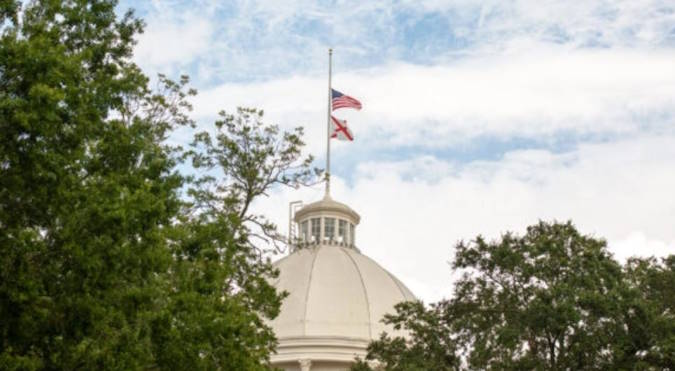
Flags fly at half-staff at the Alabama State Capitol in Montgomery, Ala., on July 26, 2020. (Lynsey Weatherspoon/Getty Images)
Alabama Governor Signs Law Banning State Funding of DEI at Public Schools, Universities
A new Alabama law that bans state agencies, local boards of education, and institutions of higher education from sponsoring so-called diversity, equity, and inclusion (DEI) programs or offices, was signed into law on Wednesday by Gov. Kay Ivey.
Alabama’s Republican-led Legislature voted on Tuesday to advance legislation SB 129, which was authored by Republican state Sen. Will Barfoot. The law will become effective Oct. 1, 2024.
An amended version of the bill was initially passed by the House of Representatives on March 7, with the Senate approving the changes in a 25–4 vote this week.
Under the measure, “divisive concepts” about race, color, religion, sex, ethnicity, or national origin would be banned from being taught or sponsored by a state agency, local board of education, or public institution of higher education, such as public universities and colleges.
The legislation outlines eight “divisive concepts,” which include teachings that any race, religion, or sex is inherently superior or inferior, or that, by virtue of an individual’s race, color, religion, sex, ethnicity, or national origin, the individual is inherently racist, sexist, or oppressive—whether consciously or subconsciously.
Other “divisive concepts” include that individuals, based on factors such as race, religion or sex, are responsible for actions committed in the past by other members of the same race, color, religion, or sex.
Reps. Murphy and Others Hold Press Conference on Bill to Ban DEI in Medical School
Specifically, the measure says that state agencies, local boards of education, or public institutions of higher education may not sponsor any DEI program or maintain any office, physical location, or department that promotes such programs; direct or compel a student, employee, or contractor to personally affirm, adopt, or adhere to a divisive concept; or require students, employees, or contractors to share their personal point of view of any divisive concept outside of an academic setting.
Transgender Bathroom Ban
In Alabama, at least eight public colleges have a specific office dedicated to diversity and inclusion efforts, according to local reports.
Furthermore, students, employees, or contractors would not be required to undergo any DEI “training, orientation, or course work that advocates or requires assent to a divisive concept,” according to the bill.
Those who refuse to support, believe, endorse, embrace, confess, or otherwise assent to a divisive concept or diversity statement must also not be penalized or discriminated against, the measure states.
Violators may be disciplined or terminated, according to the bill.
The bill notes, however, that DEI programs and discussions are allowed on campuses, provided that state funds are not used to sponsor these events.
Additionally, the bill would prohibit public universities from allowing individuals to use a restroom that is different from their biological sex.
The measure now heads to Gov. Kay Ivey’s desk, where it is widely expected to be signed into law. Upon signing, SB 129 will go into effect on Oct. 1, 2024.
Republicans have been moving to clamp down on DEI policies across the country as part of what some say are efforts to prevent “radical indoctrination” that promotes divisions in society.
A classroom sits empty, Calif., on April 1, 2020. (Justin Sullivan/Getty Images)
Bill Will Have ‘Chilling Effect’
As of July 2023, at least 22 states have so far introduced legislation regarding DEI efforts at universities, according to The Chronicle of Higher Education.
However, the latest measure has been widely criticized by Democrats, including Birmingham Mayor Randall Woodfin, who last month said he would help organize “Black parents and athletes to attend other institutions outside of the state where diversity and inclusion are prioritized.”
In a statement on its official website, the American Civil Liberties Union (ACLU) of Alabama also claims the latest bill is “intended to have a chilling effect on discourse regarding race, class, sexuality, and national origin,” and seeks to “characterize these discussions and accurate teachings, assignments, and trainings that also supplement them as ‘divisive.’”
“SB129 disrupts the work of student, staff, and faculty organizations at higher education institutions that rely on public funding from their university to develop DEI or culturally based programming,” the advocacy organization says.
“This is not only a form of classroom censorship, it’s an anti-truth bill which curtails an education on systemic inequities, racial violence, and the historic efforts to gain civil rights and civil liberties for marginalized communities throughout our nation’s history,” it adds.
After the vote by Alabama’s Legislature, the ACLU wrote on social media that it was a “blow for the activists, students, and everyday Alabamians who showed up” to oppose the bill.
However, the group vowed to continue opposing the bill either via the courts or lobbying.
“We won’t stop fighting for the rights and freedoms of ALL Alabamians,” the organization said.
Katabella Roberts
Author
Katabella Roberts is a news writer for The Epoch Times, focusing primarily on the United States, world, and business news.
From theepochtimes.com